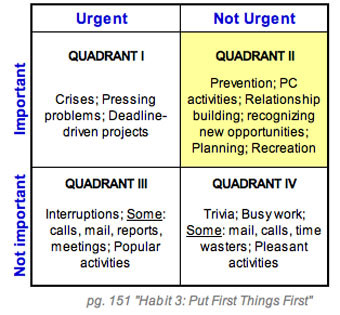Office Productivity Coach | August 24, 2009
“What lies behind us and what lies before us are tiny matters compared to what lies within us.”
- Oliver Wendell Holmes
One of the best books written on time management and life skills was the enormously popular book – The Seven Habits of Highly Effective People, first published in 1989. The book, written by Stephen R. Covey sold over 15 million copies in thirty-eight languages in fifteen years.
Covey lists seven principles that, when established as personal habits, help a person achieve “effectiveness.” Covey maintains effectiveness is achieved by aligning oneself to what he calls “true north”–principles of a character ethic that he believes to be universal and timeless.
Our character, Covey says, is a collection of our habits – which consist of knowledge, skill, and desire. Knowledge allows us to know what to do, skill gives us the ability to know how to do it, and desire is the motivation to do it.
The Seven Habits move us through the following life stages: Dependence, Independence, and Interdependence. Finally, to be truly effective, we must find the proper balance between actually producing and improving one’s capability to produce.
Another concept that Covey promotes is called the P-PC balance. P is Productivity, and PC is Productivity Capability. Covey says that it is easy to get these out of balance and spend too much time on one or the other. Too much “P” means doing a lot of work inefficiently; too much “PC” means focusing on efficiency/design/process but getting very little work done.
The 7 Habits
I: From Dependence to Independence
Dependence is the paradigm under which we are born, relying upon others to take care of us. The first three habits focus on self-mastery, so that we are able to move from dependence to independence.
Habit 1: Be Proactive
Change begins from within. Highly effective people realize they improve their lives through their influence, rather than by reacting to external events.
Habit 2: Begin with the End in Mind
Effective people have a principle-centered personal mission statement. Their long-term goals are based on personal principles.
Habit 3: Put First Things First
Highly effective people identify the key roles they take on in life, and make time for each of them. They spend time on activities that fit within their personal mission, achieving balance between production and building productive capacity.
II: From Independence to Interdependence
Habits 4, 5, and 6 address interdependence. Ideally, we are moving from Independence – the paradigm under which we can make our own decisions and take care of ourselves towards Interdependence – the paradigm under which we cooperate to achieve something that cannot be achieved independently.
Habit 4: Think Win/Win
We seek relationships and agreements that are win/win (mutually beneficial).
Habit 5: Seek First to Understand, Then to Be Understood
Covey presents this habit as the most important principle of interpersonal relations. Effective people seek first to understand the other person, and only then try to be understood. Effective listening is putting oneself in the perspective of the other person – listening empathically for both feeling and meaning.
Habit 6: Synergize
Through mutual trust and understanding, effective people seek synergy. They resolve conflicts by looking for better solutions than can be obtained through just one individual’s solution.
III: Continuous Improvement
Habit 7: Sharpen the Saw
The seventh habit is about renewal and continual improvement. The highly effective person takes time out from production and builds their production capability through personal renewal and maintaining balance among the physical, mental, emotional/social, and spiritual dimensions.
According to Covey, our daily activities can be put in one of four quadrants. Effective, proactive people spend most of their time in Quadrant II.
Consider: What one thing could you do in your life, that if you did it on a regular basis, would make a tremendous positive difference your life? (It is most likely a Quadrant II activity.)



